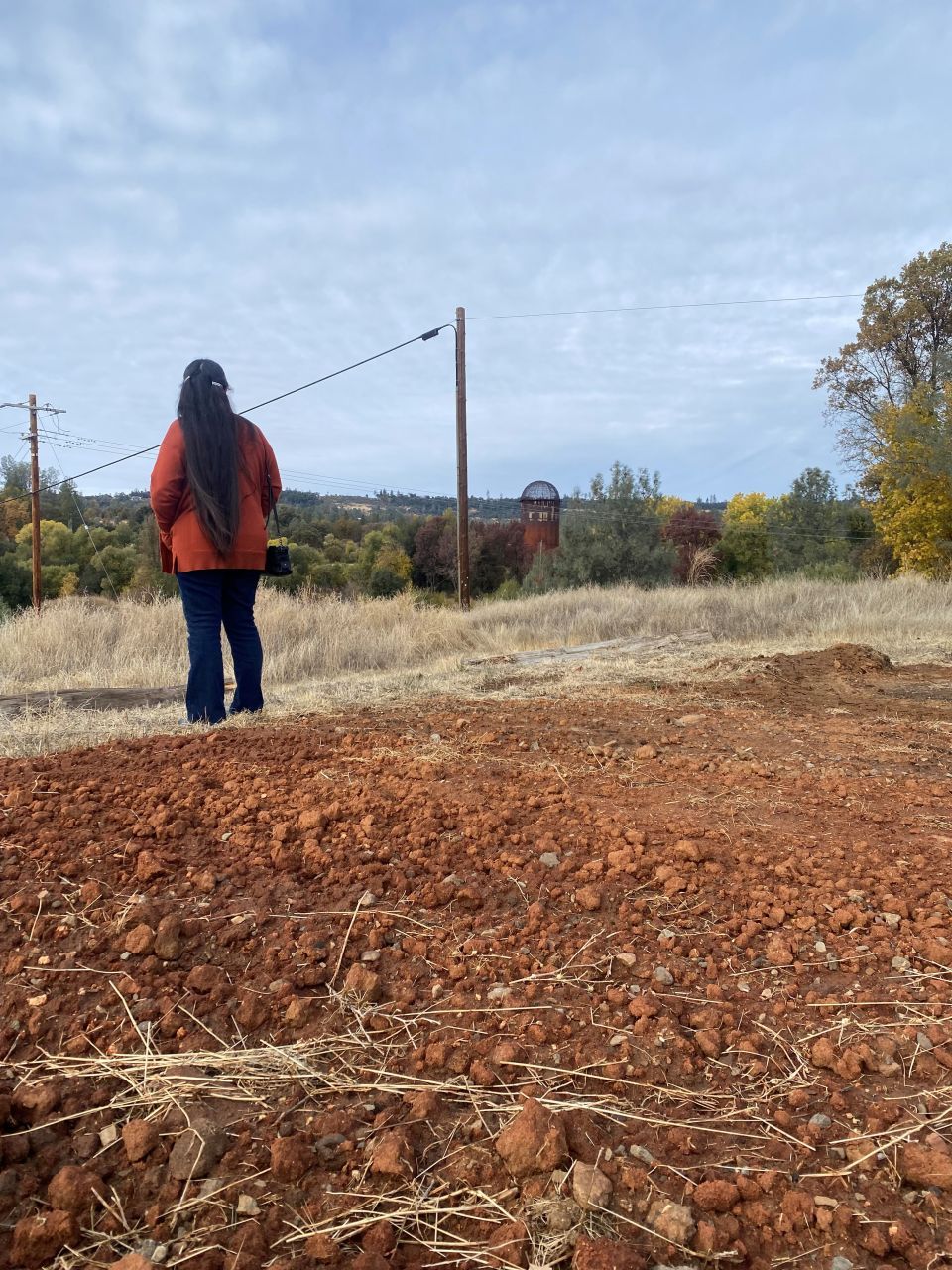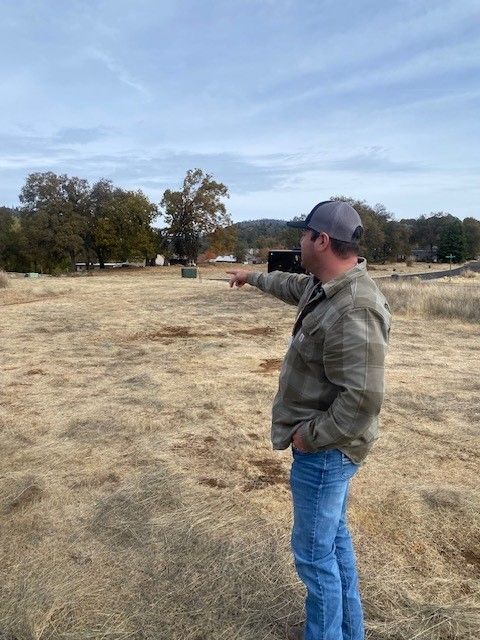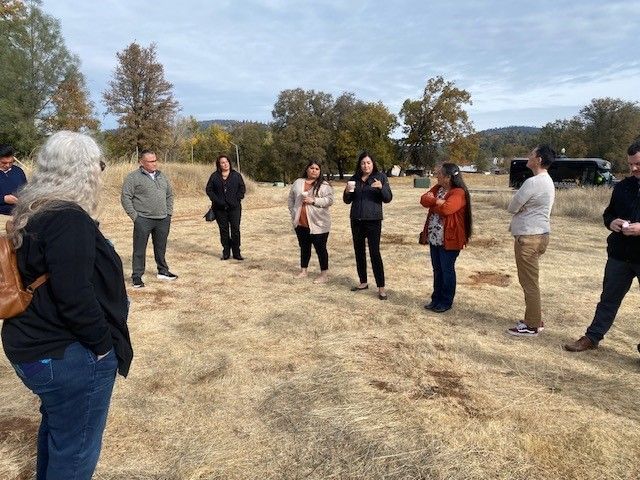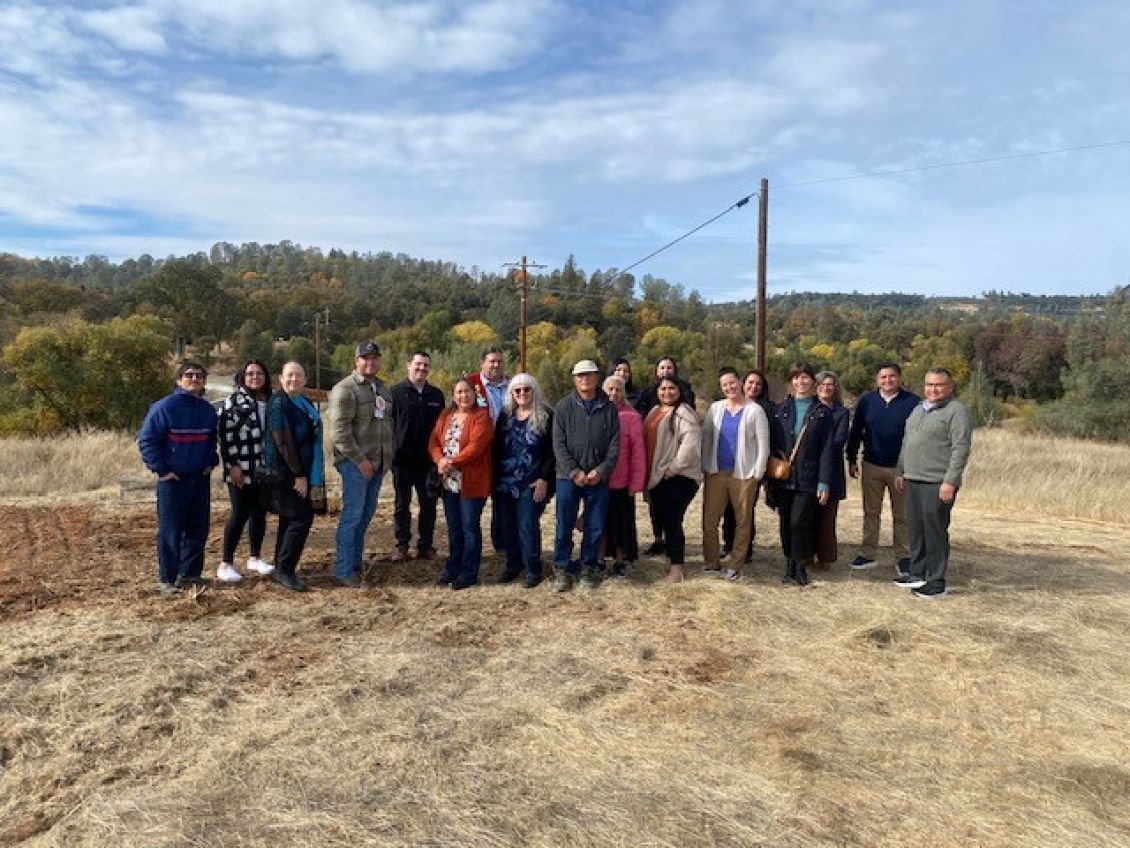On a crisp, clear November day, as wind whispered through the pines, members of nine tribes from across California gathered at a site where 30 homes will be built. The future homes will be part of a Low-Income Housing Tax Credit (LIHTC) development owned by the Tuolumne Economic Development Authority (TEDA), a federally chartered tribal corporation governed by the Tuolumne Me-Wuk Tribal Community Council.
The group gathered in Tuolumne, California—a small, unincorporated town near Yosemite National Park, the traditional homeland of the Me-wuk Indians—as part of the California Tribal Housing Accelerator Academy, which Enterprise launched in 2024 with support from U.S. Bank. The group took the opportunity to reflect on the year’s journey, exchange stories of resilience, and embrace a collective vision of growth and empowerment for their people during a meal the evening before the event at the tribally owned Teleli Golf Course.
This is where hope comes from. From each other.
Mary Norris, Tribal council chairwoman, cahto tribe
For the third year, Enterprise’s Tribal Nations team has worked with tribes in California, an effort which began in collaboration with Enterprise’s Northern California office around funding through California’s Housing and Community Development division. This program — known as Homekey— began around 2021 to fund affordable housing developments in California, and the set-aside for tribal areas galvanized tribes and development partners to consider new housing opportunities.
Advancing Housing Goals

The California Tribal Housing Accelerator Academy included an open call for applications to select nine tribes interested in training, technical assistance (TA), and support to advance their housing development goals. This initiative built on feedback from previous years, incorporating TA consultants who had worked with tribes in 2023. The Academy began with a kickoff event and a full-day training session in Sacramento in April, followed by a series of six monthly webinars for virtual training.
For many participants, the highlight of the program was the pairing of tribes with TA providers, each supported by an Enterprise lead to help monitor progress, address challenges, and celebrate successes. In total, Enterprise staff and consultants delivered 590 hours of technical assistance to California tribes in 2024. Enterprise also helped the nine cohort tribes apply for a combined total of $16.25 million in state and federal funding, with awards pending. If awarded, this funding could support the construction and rehabilitation of 124 housing units, in addition to critical infrastructure and capacity-building resources sought by the tribes.
Technical Assistance providers and partners for the CA Tribal Housing Accelerator Academy included the California-based Mosaic Urban Development, supportive housing specialists BeauxSimone Consulting, and the native-owned LACO Associates, with engineers, planners, and grant specialists.
Reflections on Accomplishments

After a meal the evening before at the tribally-owned Teleli Golf Course and blessing from the Tuolumne Economic Development Authority board member, the event kicked off in a conference room of the tribe’s Black Oaks Hotel and Casino with reflections from each participant on their accomplishments. For example:
- Big Valley Rancheria applied for the federal PRICE grant, requesting $10 million for the rehabilitation of 75 manufactured housing units.
- Tule River Tribe sought support in advancing development at their Porterville site and, with help from their TA provider, successfully submitted an IHBG competitive application for $2 million in infrastructure funding to support 10 housing units.
- Wukchumni Tribe worked with their TA provider to compile a Housing Needs Assessment, informed by a tribal member survey, to guide future planning and funding opportunities.
- Dry Creek Rancheria applied for the Tribal Climate Resilience Planning grant, requesting $250,000 in planning funds and $4 million in implementation funds for Bidu'Khaale Phase 2, which will include 25 units of supportive housing and a cultural center.
Hope Comes from ‘Each Other’
Chairwoman Mary Norris of the Cahto Tribe expressed the sense of hope created through these connections, saying, "This is where hope comes from. From each other.”
Darryl Tinkle, president of TEDA, discussed the tribe's housing development efforts through the California Tribal Housing Accelerator Academy. Tuolumne Tribe applied for a $3 million Tribal HHAP grant to close a funding gap for a 30-unit LIHTC development, consisting of 20 three-bedroom/two-bath homes and 10 four-bedroom/three-bath homes. Darryl shared that, thanks to the LIHTC award, the tribal council would now only need to contribute $2.5 million, a significant reduction in the funding gap.
Participants, who stayed at the Native-owned Black Oaks Casino, boarded a casino shuttle to visit the nearby LIHTC development site. As they surveyed the home lots, with infrastructure ready to go, Darryl expressed gratitude for the partnership with LACO, Feather and Stone, and Enterprise Community Partners. "Without these partners, this never would have happened," he said.
The development will include 10 homes set aside for community members, in line with the tribal council’s commitment to supporting a local workforce, both Native and non-Native. The site is strategically located near a water reservoir and bike trail, providing access to outdoor recreation and traditional tribal ceremonial grounds. "We are very grateful to have been a part of this, and we plan to continue to grow,” Tinkle said.
Cultivating Seeds of Opportunity
The Tuolumne Tribe is also focused on economic development. For example, the new Elevate trampoline and interactive game facility, designed for tribal families, locals, and casino guests will be “impactful for families and kids and will serve as the little heartbeat of the community," Tinkle said.
The facility features a variety of activities, including obstacle courses, trampolines, and play areas, along with attractions for older children and adults, such as axe throwing and VR gaming rooms with virtual golf, basketball, and other sports. Not only will this provide a healthy outlet for small-town community members, but like the casino and hotel, its revenues will go directly back to the tribe.
As a symbol of thanks, Tuolumne EDA was presented with a traditional beadwork medallion. The intricate beadwork displayed a vibrant red cluster of berries, symbolizing "abundance"—a powerful reminder of the possibilities that lie ahead. This abundance mindset is one that tribes can carry with them into the future of affordable housing development. Just as the berries grow and multiply in the wild, so too can the efforts of these tribes—nurtured by collaboration, knowledge-sharing, and a commitment to their communities.
The journey toward affordable housing is not only about building homes; it’s about cultivating the seeds of opportunity, creating spaces of security and belonging, and fostering a future where every tribal member can thrive in abundance.



